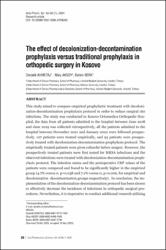| dc.contributor.author | Ahmetaj, Donjetë | |
| dc.contributor.author | Aksoy, Nilay | |
| dc.contributor.author | Berk, Barkın | |
| dc.date.accessioned | 2024-02-02T12:17:33Z | |
| dc.date.available | 2024-02-02T12:17:33Z | |
| dc.date.issued | 2024 | en_US |
| dc.identifier.citation | Ahmetaj, D., Aksoy, N. ve Berk, B. (2024). The effect of decolonization-decontamination prophylaxis versus traditional prophylaxis in orthopedic surgery in Kosovo. Acta Pharmaceutica Sciencia, 62(1), 30-41. https://dx.doi.org/10.23893/1307-2080.APS6202 | en_US |
| dc.identifier.issn | 1307-2080 | |
| dc.identifier.uri | https://dx.doi.org/10.23893/1307-2080.APS6202 | |
| dc.identifier.uri | https://hdl.handle.net/20.500.12511/12247 | |
| dc.description.abstract | This study aimed to compare empirical prophylactic treatment with decoloni-zation-decontamination prophylaxis protocol in order to reduce surgical site infections. The study was conducted in Kosovo Ortomedica Orthopedic Hos-pital, the data from all patients admitted to the hospital between June 2018 and June 2019 was collected retrospectively, all the patients admitted to the hospital between November 2021 and January 2022 were followed prospectively. 127 patients were treated empirically, and 93 patients were prospectively treated with decolonization-decontamination prophylaxis protocol. The empirically treated patients were given cefazolin before surgery. However, the prospectively treated patients were first tested for MRSA infections and the observed infections were treated with decolonization-decontamination prophylaxis protocol. The infection status and the postoperative CRP values of the patients were compared and found to be significantly higher in the empirical group (4.7% versus 0, p=0.038 and 7.1% versus 0, p=0.006, for empirical and decolonization-decontamination groups respectively). In conclusion, the implementation of the decolonization-decontamination protocol has been shown to effectively decrease the incidence of infections in orthopedic surgical procedures. Nevertheless, it is imperative to conduct additional research utilizing a more extensive sample size and pharmacoeconomic studies in order to substantiate its viability as a prophylaxis measure. | en_US |
| dc.language.iso | eng | en_US |
| dc.publisher | Istanbul Medipol University | en_US |
| dc.rights | info:eu-repo/semantics/openAccess | en_US |
| dc.subject | Surgical Site Infection | en_US |
| dc.subject | Empirical | en_US |
| dc.subject | Decolonization | en_US |
| dc.subject | Decontamination | en_US |
| dc.subject | Orthopedic Surgery | en_US |
| dc.title | The effect of decolonization-decontamination prophylaxis versus traditional prophylaxis in orthopedic surgery in Kosovo | en_US |
| dc.type | article | en_US |
| dc.relation.ispartof | Acta Pharmaceutica Sciencia | en_US |
| dc.department | İstanbul Medipol Üniversitesi, Eczacılık Fakültesi, Eczacılık Meslek Bilimleri Bölümü, Klinik Eczacılık Ana Bilim Dalı | en_US |
| dc.department | İstanbul Medipol Üniversitesi, Eczacılık Fakültesi, Eczacılık Meslek Bilimleri Bölümü, Farmasötik Kimya Ana Bilim Dalı | en_US |
| dc.authorid | 0000-0001-9712-1420 | en_US |
| dc.authorid | 0000-0001-6047-2796 | en_US |
| dc.identifier.volume | 62 | en_US |
| dc.identifier.issue | 1 | en_US |
| dc.identifier.startpage | 30 | en_US |
| dc.identifier.endpage | 41 | en_US |
| dc.relation.publicationcategory | Makale - Uluslararası Hakemli Dergi - Kurum Öğretim Elemanı | en_US |
| dc.identifier.doi | 10.23893/1307-2080.APS6202 | en_US |
| dc.institutionauthor | Ahmetaj, Donjetë | |
| dc.institutionauthor | Berk, Barkın | |
| dc.identifier.scopus | 2-s2.0-85183033928 | en_US |
| dc.identifier.scopusquality | Q3 | en_US |


















